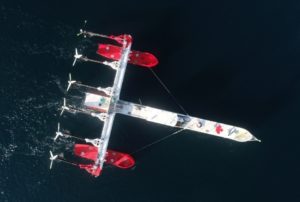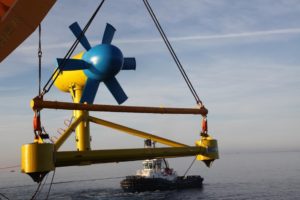Decarbonization of Electricity Generation on Philippine Islands (Using Tidal Stream & PV Solar)
Announcements
To get periodic updates from us, please register for the newsletter here.
Request for Proposals
The Program is seeking a consulting firm or a consortium of consulting firms to support the implementation of the TC component. Interested organizations are invited to apply with their offers as described in the RfP document.
Ocean energy, specifically Tidal Stream Energy (TSE), is expected to make a significant contribution – together with other renewable energy sources – to achieve the goals of the Paris Climate Agreement. The Philippine energy sector relies heavily on fossil fuels, which stand as the largest contributor to the country’s greenhouse gas (GHG) emissions. This is reflected by the fact that most of the 2,000 inhabited islands of the Philippines are not connected to the national electric grids. Instead, they often rely on inefficient diesel generators as their only source of electricity supply. Consequently, these off-grid islands suffer from high local environmental pollution due to diesel combustion, a largely unreliable and part-time electricity supply, and high cost of electricity generation. This high cost requires considerable subsidies to cover the gap between affordable end-user tariffs and the true cost of generation.
In this context, a combination of TSE with other renewable energy technologies (hybrid systems) are a highly efficient solution. However, these systems are rarely used on a utility scale due to challenges such as (1) lack of access to favorable financing products, (2) lack of awareness about the effectiveness and effectivity of TSE and TSE hybrid systems and (3) the lack of a regulatory framework to promote these technologies.
Implemented by Frankfurt School of Finance & Management and its partner Friedrichsdorfer Institut zur Nachhaltigkeit (IzN), the Program “Philippines – Decarbonization of Electricity Generation on Philippine Islands – Using Tidal Stream and Solar PV”, has been selected by the Mitigation Action Facility (MAF) in September 2023 and shall start Implementation on October 1st, 2024. MAF has committed EUR 20 million grants for supporting the development of TSE in the Philippines to provide clean energy to islands so far not connected to the general electricity grid. The funding shall be used both for funding TSE projects via financial cooperation (FC) and advisory support via technical cooperation (TC) . The FC component will offer long-term concessional loans via partner banks and blend those loans with CAPEX grants thus rendering the TSE hybrid system investment project viable. The TC component will support the different government institutions involved, small island energy providers and banks to integrate TSE into their procedures.
Description of the Project
Ocean energy, specifically Tidal Stream Energy (TSE), is expected to make a significant contribution – together with other renewable energy sources – to achieve the goals of the Paris Climate Agreement. The Philippine energy sector relies heavily on fossil fuels, which stand as the largest contributor to the country’s greenhouse gas (GHG) emissions. This is reflected by the fact that most of the 2,000 inhabited islands of the Philippines are not connected to the national electric grids. Instead, they often rely on inefficient diesel generators as their only source of electricity supply. Consequently, these off-grid islands suffer from high local environmental pollution due to diesel combustion, a largely unreliable and part-time electricity supply, and high cost of electricity generation. This high cost requires considerable subsidies to cover the gap between affordable end-user tariffs and the true cost of generation.
In this context, a combination of TSE with other renewable energy technologies (hybrid systems) are a highly efficient solution. However, these systems are rarely used on a utility scale due to challenges such as (1) lack of access to favorable financing products, (2) lack of awareness about the effectiveness and effectivity of TSE and TSE hybrid systems and (3) the lack of a regulatory framework to promote these technologies.
Implemented by Frankfurt School of Finance & Management and its partner Friedrichsdorfer Institut zur Nachhaltigkeit (IzN), the Program “Philippines – Decarbonization of Electricity Generation on Philippine Islands – Using Tidal Stream and Solar PV”, has been selected by the Mitigation Action Facility (MAF) in September 2023 and shall start Implementation on October 1st, 2024. MAF has committed EUR 20 million grants for supporting the development of TSE in the Philippines to provide clean energy to islands so far not connected to the general electricity grid. The funding shall be used both for funding TSE projects via financial cooperation (FC) and advisory support via technical cooperation (TC) . The FC component will offer long-term concessional loans via partner banks and blend those loans with CAPEX grants thus rendering the TSE hybrid system investment project viable. The TC component will support the different government institutions involved, small island energy providers and banks to integrate TSE into their procedures.
The expected impact of this Program is that small island grid operators will be able to substitute fossil fuel-based electricity generation through TSE hybrid systems via replicable sustainable private investment projects. These projects will install around 64 MW of TSE hybrid systems, and around 100 MWh battery storage in off-grid islands in the Philippines during the lifespan of the Program. Additionally, the Program expects to catalyze the market for privately financed TSE hybrid investment projects by making financing sources accessible and adjusting the regulatory conditions. The grants are expected to leverage some EUR 164 million from the public and private sectors.

The floating device of „Sustainable Marine” with 6 turbines à 70 kW (420 kW device), anchored by moorings.
The Program aims to develop the TSE technology to full market maturity. The Philippines, with its enormous potential of 170 GW of ocean energy among more than a thousand inhabited islands, offers ideal conditions to convert old and inefficient diesel generators to modern hybrid energy systems based on renewable energies.
The Philippine partners are the Department of Energy (DOE) and the Climate Change Commission of the Philippines, which steer the program. Other stakeholders include the Energy Regulatory Commission (ERC), the NPC-SPUG (National Power Corporation – Small Power Utilities Group), and the Energy Cooperatives as direct buyers of the electricity generated, among other stakeholders.

Source: ©Balao for Sabella
For more information regarding the Mitigation Action Facility please click here.